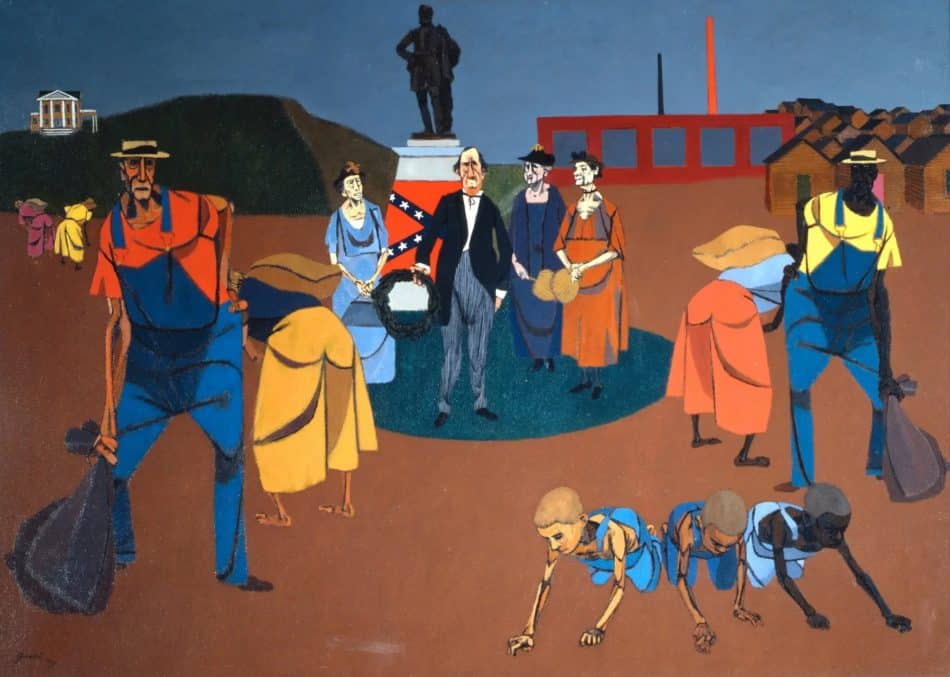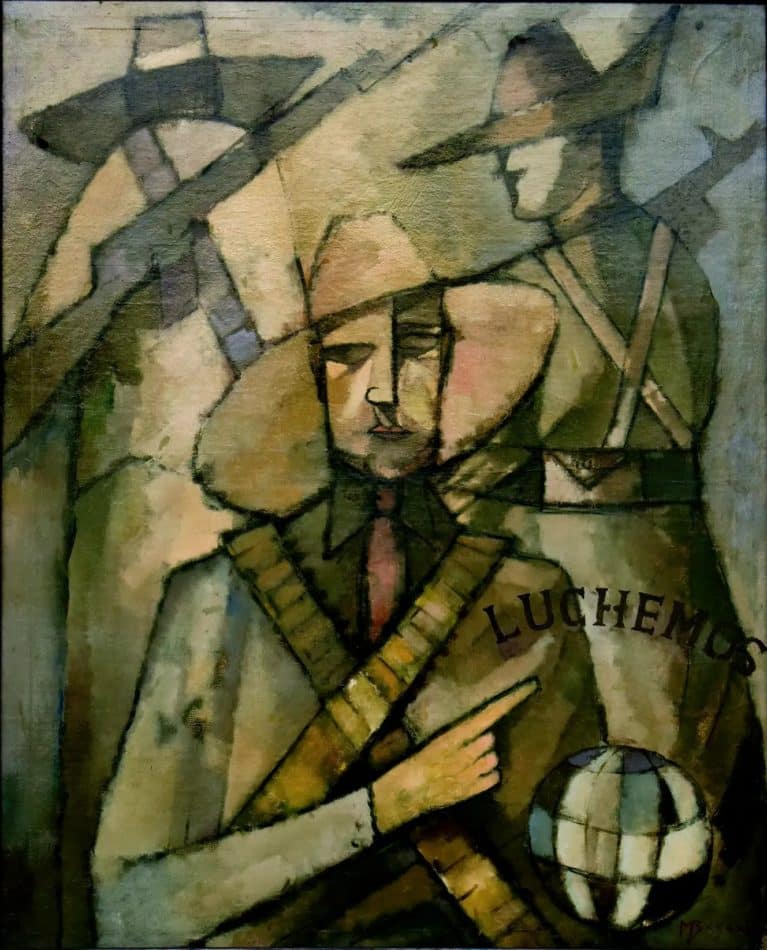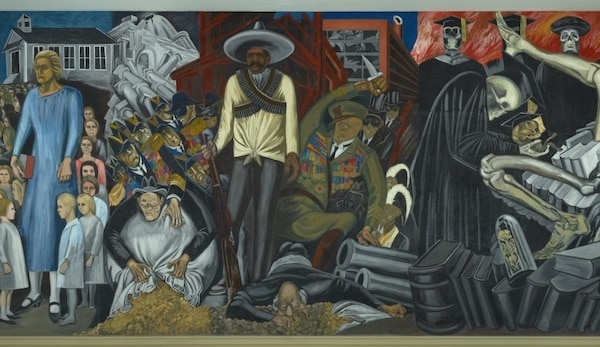Dear friends,
Greetings from the desk of Tricontinental: Institute for Social Research.
In his inaugural presidential address on 20 January 2017, Donald Trump used a powerful phrase to describe the situation in the United States: ‘American carnage’. In 1941, seventy-six years before this speech, Henry Luce wrote an article in Life magazine about the ‘American century’ and the promise of U.S. leadership to be ‘the dynamic centre of ever-widening spheres of enterprise’. During the period between these two proclamations, the United States went through an immense expansion known as the ‘Golden Age’ and then a remarkable decline.
That theme of decline has returned in Trump’s 2024 presidential campaign. ‘We will not let countries come in, take our jobs, and plunder our nation’, Trump declared at the Republican National Convention on 19 July in his speech to accept his party’s presidential nomination. Trump’s words echoed his inaugural address from 2017, in which he said, ‘We’ve made other countries rich while the wealth, strength, and confidence of our country has disappeared over the horizon’.
In seven decades, the United States’s self-image has fallen from the grandiose heights of an ‘American century’ to the bloodied present of ‘American carnage’. The ‘carnage’ that Trump identifies is not only in the economic domain; it defines the political arena. A failed assassination attempt against Trump comes alongside an open rebellion in the Democratic Party that ended with incumbent U.S. President Joe Biden withdrawing from the presidential race and endorsing Vice President Kamala Harris as his replacement. By all accounts, Trump will be favoured to defeat any Democratic candidate at the polls in November, since he leads in a handful of key ‘swing states’ (which house a fifth of the U.S. population).
At the Republican convention, Trump tried to talk about unity, but this is a false language. The more U.S. politicians talk about ‘bringing the country together’ or bipartisanship, the wider the divides tend to be between liberals and conservatives. What divides them is not policy as such, since the two parties both belong to the extreme centre that pledges to impose austerity on the masses while securing financial security for the dominant classes, but an attitude and orientation. A few domestic policies (important as they are, such as abortion rights) play a key role in allowing this difference of mood to emerge.

Robert Gwathmey (USA), Sunny South, 1944.
Reports and rumours filter out of U.S. government documents that give a glimpse of the ongoing devastation of social life. Younger people find themselves at the mercy of precarious employment. Home foreclosures and evictions for those in the lower ends of the income bracket continue as sheriffs and debt-recovery paramilitaries scour the landscape for so-called delinquents. Personal debt has skyrocketed as ordinary people with inadequate means of earning a living turn to credit cards and the shady world of personal loan agencies to keep from starving. The Third Great Depression has made low-wage service workers with no benefits, most of whom are women, even more vulnerable. In earlier instances of economic depression, these women, with those jobs, stretched their invisible hearts across their families; now, even this love-fuelled glue is no longer available.

Hector Hyppolite (Haiti), Marinéte pie chè che (MARinÉ I), 1944—1946.
On 18 July, the International Monetary Fund (IMF) released its staff report on the United States, which showed that poverty rates in the country ‘increased by 4.6 percentage points in 2022 and the child poverty rate more than doubled’. This increase in child poverty is ‘directly attributed to the expiration of pandemic-era assistance’, the IMF wrote. No longer will any government in the United States, with its tanking economy and increasing military spending, provide access to basic conditions for survival for millions of families. One paragraph in the report struck me as particularly significant:
The increased pressure on lower income households is becoming more visible in an upswing in delinquencies on revolving credit. Furthermore, worsening housing affordability has aggravated access to shelter, particularly for the young and lower income households. This is evident in the number of people experiencing homelessness, which has risen to the highest level since data began to be compiled in 2007.
Swathes of the U.S. landscape are now given over to desolation: abandoned factories make room for chimney swallows while old farmhouses become methamphetamine labs. There is sorrow in the broken rural dreams, the gap between the distress of farmers in Iowa not so far from the distress of peasants in Brazil, India, and South Africa. Those who had previously been employed in mass industrial production or in agriculture are no longer necessary to the cycles of capital accumulation in the United States. They have been rendered disposable.
By the time that China developed the Belt and Road Initiative (BRI) to enhance infrastructure around the world in 2013, the United States had slipped into its own rust belt and broken road reality.
It is impossible for the U.S. political class that is committed to this politics of austerity to control, let alone reverse, this downward spiral. Austerity policies cannibalise social life, razing everything that makes it possible for humans to live in the modern world. For decades, the parties of liberalism and conservatism have muted their historical traditions and become shadows of each other. Just as the water in a toilet rushes in a spiral and gets dragged into the sewer, the parties of the ruling class have dashed toward the extreme centre to champion austerity and to allow an obscene upward distribution of wealth in the name of spurring entrepreneurism and growth.
Whether in Europe or in North America, today the extreme centre is increasingly losing its legitimacy amongst populations in the Global North stunted by malaise. Ugly proposals allegedly seeking to spur growth that would have sounded acceptable three decades ago—such as tax cuts and increased military spending—now have a hollowness to them. The political class has no effective answers for stagnant growth and decayed infrastructure. In the United States, Trump has hit upon a politically expedient way of talking about the country’s problems, but his own solutions—such as the idea that militarising borders and escalating trade wars will be able to magically create the investment needed to ‘make America great again’—are in fact just as hollow as those of his rivals. Despite enacting a set of laws to encourage productive investment (such as the Inflation Reduction Act, Creating Helpful Incentives to Produce Semiconductors [CHIPS] and Science Act, and the Infrastructure Investment and Jobs Act), the U.S. government has failed to address enormous gap in necessary fixed capital formation. Apart from debt, there are few other sources for investment in the country’s infrastructure. Even the U.S. Federal Reserve Bank doubts the possibility that the U.S. can easily delink its economy from that of booming China.

Moisés Becerra (Honduras), Luchemos (Let’s Struggle), 1971.
It is tempting to throw around words like ‘fascism’ to describe political tendencies such as those led by Trump and an assorted group of right-wing leaders in Europe. But the use of this term is not precise, since it ignores the fact that Trump and others make up a far right of a special kind, one that is reasonably comfortable with democratic institutions. This far right pierces neoliberal rhetoric by appealing to the anguish caused by the decline of their countries and by using patriotic language that arouses great feelings of nationalism amongst people who have felt ‘left out’ for at least a generation. Yet, rather than blame the project of neoliberalism for that national decline, the leaders of this far right of a special kind blame it on working-class immigrants and on new cultural forms that have emerged in their countries (particularly increasing social acceptance for gender and racial equality and sexual freedom). Since this far right has no new project to offer to the people to reverse this decline, it forges ahead with neoliberal policies with as much gusto as the extreme centre.
Meanwhile, unable to make a break with the extreme centre, the exhausted forces of liberalism can only shout that they are a better alternative than the far right. This is a broken choice that has reduced political life to different sides of the extreme centre. A genuine break is needed from the carnage. Neither the far right of a special kind nor liberalism can provide that break.

Angelina Quic Ixtamer (Guatemala), Mayan Market, 2014.
In 1942, the economist Joseph Schumpeter published Capitalism, Socialism, and Democracy. Schumpeter argued that, over its history, capitalism has generated a series of business downturns when failed enterprises close. In the ashes of these crashes, Schumpeter said, a phoenix is born through ‘creative destruction’. However, even if ‘creative destruction’ eventually produces new lines of enterprise and therefore employment, the carnage it causes results in the possibility of a political turn to socialism. Though the march to socialism has not yet taken place in the United States, larger and larger numbers of young people are more and more attracted to this possibility.
In 1968, the night before he was killed, Martin Luther King, Jr., said, ‘only when it is dark enough can you see the stars’. It now seems dark enough. Perhaps not in this election or the next one, or even the one after that, but soon the choices will narrow, the extreme centre—already illegitimate—will vanish, and new projects will germinate that will enhance the lives of the people instead of using the social wealth of the Global North to terrorise the world and enrich the few. We can see those stars. Hands are striving to reach them.
Warmly,
Vijay

